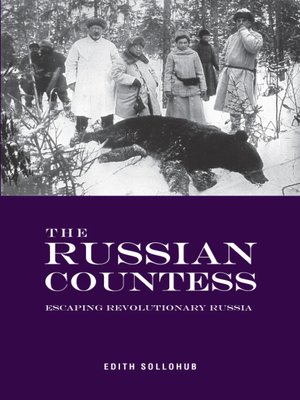
Sign up to save your library
With an OverDrive account, you can save your favorite libraries for at-a-glance information about availability. Find out more about OverDrive accounts.
Find this title in Libby, the library reading app by OverDrive.



Search for a digital library with this title
Title found at these libraries:
| Library Name | Distance |
|---|---|
| Loading... |
Countess Edith Sollohub, born Edith Natalie de Martens, was well known in pre-revolutionary
St. Petersburg for accompanying her husband Alexander on shooting and riding
trips and for being outstandingly accurate with her gun. She was the daughter of
a high-ranking Russian diplomat, and the mother of three young sons, destined to join
the social and intellectual elite of imperial Russia. The Revolution of 1917 changed the
course of these lives.
By December 1918 her husband was dead, her children separated from her by the closing
of the frontiers, and her own life was in danger. This is her account of how she faced
these traumatic events, revealing the courage and determination she had shown in
Countess Edith Sollohub, born Edith Natalie de Martens, was well known in pre-revolutionary
St. Petersburg for accompanying her husband Alexander on shooting and riding
trips and for being outstandingly accurate with her gun. She was the daughter of
a high-ranking Russian diplomat, and the mother of three young sons, destined to join
the social and intellectual elite of imperial Russia. The Revolution of 1917 changed the
course of these lives.
By December 1918 her husband was dead, her children separated from her by the closing
of the frontiers, and her own life was in danger. This is her account of how she faced
these traumatic events, revealing the courage and determination she had shown in
earlier times that helped her endure hunger, imprisonment, and loneliness. Her reunion
with her sons in 1921 makes the months of danger and deprivation worthwhile.
St. Petersburg for accompanying her husband Alexander on shooting and riding
trips and for being outstandingly accurate with her gun. She was the daughter of
a high-ranking Russian diplomat, and the mother of three young sons, destined to join
the social and intellectual elite of imperial Russia. The Revolution of 1917 changed the
course of these lives.
By December 1918 her husband was dead, her children separated from her by the closing
of the frontiers, and her own life was in danger. This is her account of how she faced
these traumatic events, revealing the courage and determination she had shown in
Countess Edith Sollohub, born Edith Natalie de Martens, was well known in pre-revolutionary
St. Petersburg for accompanying her husband Alexander on shooting and riding
trips and for being outstandingly accurate with her gun. She was the daughter of
a high-ranking Russian diplomat, and the mother of three young sons, destined to join
the social and intellectual elite of imperial Russia. The Revolution of 1917 changed the
course of these lives.
By December 1918 her husband was dead, her children separated from her by the closing
of the frontiers, and her own life was in danger. This is her account of how she faced
these traumatic events, revealing the courage and determination she had shown in
earlier times that helped her endure hunger, imprisonment, and loneliness. Her reunion
with her sons in 1921 makes the months of danger and deprivation worthwhile.







